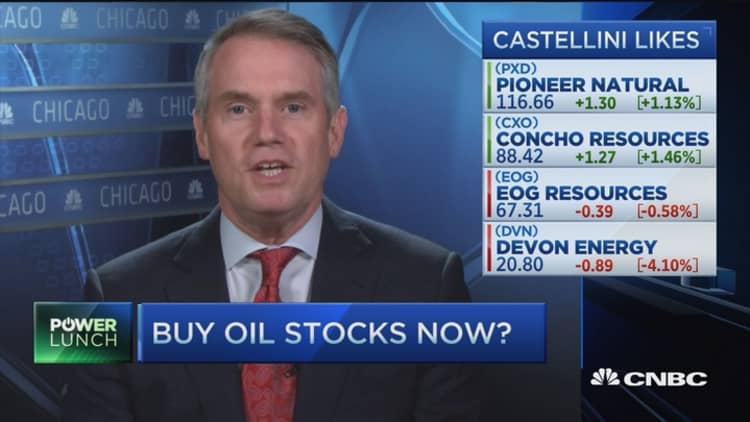


The oil market rallied on Tuesday morning as chatter emerged that Qatar, Venezuela, Saudi Arabia and Russia met to freeze output of oil at January levels. After the brief rally, oil resumed its bearish position as none of the oil producing countries bit the bullet and cut production.
"They're freezing levels at record levels, so that's not really a less bearish scenario," Kyle Cooper, Criterion Research managing director of oil and energy, told CNBC's "Power Lunch" on Tuesday. "Iran hasn't chimed in at all, and they're still actually claiming for increased output."
In the same vein, the oversupplied oil market has witnessed no catalyst that has increase demand. Meanwhile, oil prices have continued to flirt within the upper $20 range. Due to no reduction in current output levels, Cooper anticipates that oil prices could still go lower.
"I think there's at least a 50/50 chance that we test the $26.05 from last week," he said. "Then I think you got something in the $22, $23 type range."
Low oil prices raise the question of the possible investment risks for energy investors.
In a low oil price environment, "all stocks have become oil stocks," Jerry Castellini, CastleArk Management president and CIO, told CNBC.
"When Deutsche Bank and Nomura (big banks in Germany and Japan that are net importers of energy) are down at all-time lows, that suggests that the whole global economy is exposed to this mid-20s oil price scenario," he said.
Castellini foresees that the current dialogue between the oil producers will precede "a much bigger agreement."
In this light, the chief investment officer suggests that market watchers start investing in exploration and production oil companies. Castellini's top picks are Pioneer Natural, Concho Resources, EOG Resources and Devon Energy. These four companies have "solid balance sheets" and substantial positions in the Permian Basin horizontal oil play, the investor told CNBC. The trader and his firm currently own these stocks.
"The Saudis and Russians haven't talked since the fall of 2014," he said. "The fact that they sat and had a very cheery hour conversation today about a freeze is a huge, huge watershed event."
Cooper argues that the market will remain oversupplied given that the talks are of a production freeze, not a cut. "Freezing at levels that are still way oversupplied, still says you don't have a rebalance coming anytime soon," Cooper said.
Castellini, however, told "Power Lunch" that the next event would be Iran joining in the conversation. Castellini claims that Iran has "every bit of upside" to join Russia, their "allies." He predicts production cuts in the near future, and payoffs from exploration and production companies at about a year from now.
"The fact is everyone is a winner with the 5 percent production cut that is supposedly on the table," he said. "Expect that to happen here, over the next five to six months."
On the other hand, Brenda Shaffer, senior global fellow at the Atlantic Council's Global Energy Center, told CNBC's "Closing Bell" the meeting was a tactical and genius move from Saudi Arabia and Russia.
"No matter what, just by talking about it they've gained a lot financially," she said. "Also, this puts the blame on Iran. It makes it look like Russia and Saudi Arabia are really trying to be very productive and helpful in the market."



